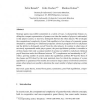134 search results - page 5 / 27 » On the Complexity of Computing Values of Restricted Games |
STACS
2007
Springer
14 years 1 months ago
2007
Springer
Strategic games may exhibit symmetries in a variety of ways. A characteristic feature, enabling the compact representation of games even when the number of players is unbounded, i...
COCO
2005
Springer
14 years 1 months ago
2005
Springer
We study the complexity of solving succinct zero-sum games, i.e., the games whose payoff matrix M is given implicitly by a Boolean circuit C such that M(i, j) = C(i, j). We comple...
ICALP
2009
Springer
14 years 8 months ago
2009
Springer
We analyse the computational complexity of finding Nash equilibria in simple stochastic multiplayer games. We show that restricting the search space to equilibria whose payoffs fal...
CORR
2008
Springer
13 years 7 months ago
2008
Springer
Many models from a variety of areas involve the computation of an equilibrium or fixed point of some kind. Examples include Nash equilibria in games; market equilibria; computing o...
CIE
2010
Springer
13 years 11 months ago
2010
Springer
In the theory of algorithmic randomness, one of the central notions is that of computable randomness. An infinite binary sequence X is computably random if no recursive martingale...

